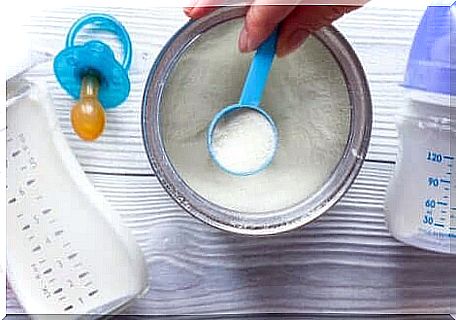What Is The Best Milk For Children Over One Year Old?

Parents need to be able to choose the right kind of milk for their children when they are one year old. Namely, the wrong choice can increase the risk of a child becoming ill, especially with metabolic or autoimmune diseases. What is the best milk for children over one year old? What should be taken into account when choosing milk? In this article, we will tell you everything you need on the subject.
Breast milk is the best nutrition for babies. However, after one year of age, children’s energy needs increase, and breast milk can no longer be the child’s only source of nutrition. With this in mind, parents need to be able to choose quality products that meet their children’s nutritional needs.
Best milk for children over one year: take into account added sugars
The problem with many baby milks is that they contain added sugar. Sugar can impair the metabolic health of young children, increasing the risk of disease in children or adults.
A study led by the European Pediatric Association found that reducing simple sugars in children’s diets helps prevent metabolic disorders such as diabetes.
Thus, if no attention is paid to the added sugar in the milk, it can lead to adverse effects on the health of children. In addition, such products have been linked to changes in a person’s fat values.

The role of omega-3 in infant formulas
You’ve probably already heard about the benefits of Omega-3 in your diet, so it’s a fatty acid that has anti-inflammatory ability. Regular intake of these fatty acids helps, among other things, to reduce the risk of cardiovascular disease, as has been shown in many studies.
In addition, these fatty acids are especially important for the growth of children. Intake of these nutrients at an early stage of life is able to reduce the incidence of autoimmune processes. In this regard, a 2017 study found a link between regular intake of Omega-3 fatty acids in young children and a lower risk of asthma.
It is therefore important to take this into account when choosing the right kind of milk for a child over the age of one. In other words, make sure the product you choose contains these fatty acids.
The best milk for those over one year of age contains vitamin D.
Vitamin D deficiency is common in the population. A study of 97 pregnant women and 90 infants concluded that levels of this micronutrient were generally below the reference values.
Low vitamin D intake can affect a person’s bone health as an adult, increasing the risk of osteoporosis. This ailment is common in postmenopausal women and is a significant risk to overall health and well-being.
In addition, low levels of this vitamin have been linked to decreased muscle strength and an increased risk of multifactorial diseases.
Vitamin D is a nutrient that is difficult to get enough from food alone. The best way to secure its intake is to sunbathe in healthy amounts. To reduce the risk of vitamin D deficiency in children, milk should be chosen that is high in this micronutrient.

Choosing the right kind of milk for children over the age of one is no easy task
As you can see, there are three different factors involved in choosing the right kind of milk that should be kept in mind. Of course, other things should also be taken into account, such as additives, brand reliability, etc.
To choose the right option, read the product description. Failure to read it may result in you choosing a product that is of poor quality or high in simple sugars.
Keep in mind that babies and children are still developing, so a high intake of harmful substances can increase the risk of developing multifactorial diseases in adulthood. For this reason, parents need to be careful about their children’s nutrition right from the moment they are born.









